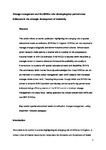Change management and the SENCo role: developing key performance indicators in the strategic development of inclusivity
| dc.contributor.author | Done, L | |
| dc.contributor.author | Murphy, M | |
| dc.contributor.author | Watt, M | |
| dc.date.accessioned | 2018-09-10T07:47:12Z | |
| dc.date.available | 2018-09-10T07:47:12Z | |
| dc.date.issued | 2016-11-30 | |
| dc.identifier.issn | 0268-2141 | |
| dc.identifier.issn | 1467-9604 | |
| dc.identifier.uri | http://hdl.handle.net/10026.1/12256 | |
| dc.description.abstract |
This article follows an earlier publication highlighting the changing role of special educational needs co-ordinators (SENCos) in England. SENCos are now required to manage change strategically and deliver inclusive school cultures. School-based action research undertaken by a teacher studying for the postgraduate National Award for SEN Co-ordination (NASENCO) is featured in the article; a strategic review of resource allocation increased the availability and quality of interventions for students with special educational needs and disabilities (SEND). The commentary which frames the study acknowledges that many SENCos are not yet members of a senior school management team (SMT) despite their mandated strategic whole-school remit. Featuring the process through which one SENCo has strived to enhance SEND provision and develop context-specific key performance indicators brings official guidance on the SENCo's role in strategic change management into sharp focus, raising questions that should concern both SMTs and non-SMT SENCos. | |
| dc.format.extent | 281-295 | |
| dc.language | en | |
| dc.language.iso | en | |
| dc.publisher | Wiley | |
| dc.title | Change management and the SENCo role: developing key performance indicators in the strategic development of inclusivity | |
| dc.type | journal-article | |
| dc.type | Journal Article | |
| plymouth.issue | 4 | |
| plymouth.volume | 31 | |
| plymouth.publication-status | Published | |
| plymouth.journal | Support for Learning | |
| dc.identifier.doi | 10.1111/1467-9604.12138 | |
| plymouth.organisational-group | /Plymouth | |
| plymouth.organisational-group | /Plymouth/Faculty of Arts, Humanities and Business | |
| plymouth.organisational-group | /Plymouth/Faculty of Arts, Humanities and Business/Plymouth Institute of Education | |
| plymouth.organisational-group | /Plymouth/REF 2021 Researchers by UoA | |
| plymouth.organisational-group | /Plymouth/REF 2021 Researchers by UoA/UoA23 Education | |
| plymouth.organisational-group | /Plymouth/Research Groups | |
| plymouth.organisational-group | /Plymouth/Research Groups/Institute of Health and Community | |
| plymouth.organisational-group | /Plymouth/Users by role | |
| plymouth.organisational-group | /Plymouth/Users by role/Academics | |
| dcterms.dateAccepted | 2016-11-07 | |
| dc.rights.embargodate | 2019-2-1 | |
| dc.identifier.eissn | 1467-9604 | |
| dc.rights.embargoperiod | Not known | |
| rioxxterms.versionofrecord | 10.1111/1467-9604.12138 | |
| rioxxterms.licenseref.uri | http://www.rioxx.net/licenses/all-rights-reserved | |
| rioxxterms.licenseref.startdate | 2016-11-30 | |
| rioxxterms.type | Journal Article/Review |


